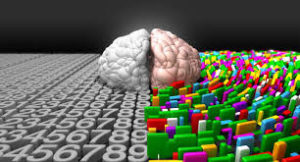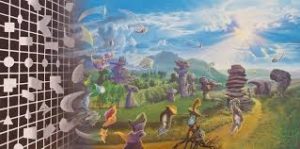Every cell, is a sender and a receiver. All of the larger divisions of life — the mammals, fish, birds, and so forth — are an integral part of that living grid-work. The picture of the world is not only the result of those messages transmitted and received, however, but is also caused by the relationships between those messages. In our terms, then, all of life’s large classifications were present “at the beginning of the world.” Otherwise there would have been vast holes in that grid of perception that makes possible the very sensations of physical life.
In a manner of speaking, the physical universe is “transposed” upon another reality that must be its source. The world was and is created in dimensions outside of time, and outside of space as we understand it.
Other realities quite as legitimate as our own, quite as vital, quite as “real,” coexist with our own, and in the terms of our understanding, “in the same space” — but of course in terms of our experience those spaces and realities would appear to be quite separate. No systems are closed, however, so that basically the living grid of perception that causes one world or reality is also “wired into” all other such systems. There is a give-and-take between them.
The grids of perception that compose our world give us the world picture as we experience it because our physical senses put us in a certain position within the entire grid. Animals, for example, while part of our experience, are also “tuned into” that grid at another level. The large classifications of mammals, fish, birds, men and women, reptiles, plants, and so forth, are each an integral part of that larger perceptive pattern — and that pattern in those terms had to be complete even in the beginning of our time.
In various periods that “grid-work” might “carry more traffic” along certain circuits than at other periods, so that there has been some creative leeway allowed, particularly on the parts of the species that make up our larger classifications. There were always birds, for example, but in the great interplay of “interior” and exterior communication among all portions of this vast living system, there was a creative interplay that allowed for endless variations within that classification, and each other one.
Our technological communication system is a conscious construct — a magnificent one — but one that is based upon our innate knowledge of the inner, cellular communication between all species. Saying that, I am not robbing the intellect of its right to congratulate itself upon that technology.
The large classifications of life give us the patterns into which consciousness forms itself, and because those patterns seem relatively stable it is easy to miss the fact that they are filled out, so to speak, in each moment with new energy. Man and woman do not in his and her physical development pass through the stages supposedly followed by the hypothetical creature who left the water for the land to become a mammal — but each species does indeed have written within it the knowledge of “its past.” Part of this, again, is most difficult to express, and I must try to fill out old words with new meanings. The reincarnational aspects of physical life, however, serve a very important purpose, providing an inner subjective background. Such a background is needed by every species.
Reincarnation exists, then, on the part of all species. Once a consciousness, however, has chosen the larger classification of its physical existences, it stays within that framework in its “reincarnational” existences. Mammals return as mammals, for example, but the species can change within that classification. This provides great genetic strength, and consciousnesses in those classifications have chosen them because of their own propensities and purposes. The animals, for example, seem to have a limited range of physical activity in conscious terms, as we think of them. An animal cannot decide to read a newspaper. Newspapers are outside of its reality. Animals have a much wider range, practically speaking, in certain other areas. They are much more intimately aware of their environment, of themselves as separate from it, but also of themselves as a part of it. In that regard, their experience deals with relationships of another kind.
These grids of perception “do not exist forever” in our dimension of time, for our dimension of time cannot hold anything that is outside it. Once a world exists, however, it becomes imprinted or stamped upon eternity, so that is exists in time and out of it “at once.”
When we ask: “When did the world begin?” or “What really happened?” or “Was there a Garden if Eden?” , we are referring to the world as we understand it, but in those terms there were earths in the same space before the earth we recognize existed, and they began in the manner that I have given in earlier blogs. The patterns for worlds — the patterns — continue in our time dimension, though in that time dimension those worlds must disappear, again, to continue “their existence outside of time.” The patterns are filled out again.
In the case of earth the grid of perception is simply used differently, certain areas becoming prominent in some eras, and less prominent in others. Using our idea of time, I can only say that when the entire gestalt of consciousnesses that formed a particular earth have formed its reality to the best of their abilities, fulfilling their individual and mass capacities as far as possible, then they lovingly turn over that grid to others, and continue to take part in existences that are not physical in our terms. And that has happened many times.
Our tale about the Garden of Eden, then, is a legend about earth’s ; past beginning. Each world is so cunningly constructed, again, that each consciousness, regardless of its degree, plays a vital part. And each of our actions, however inconsequential, becomes connected in one way or another — in one way or another — to each other reality and each other world.
Now in a manner of speaking — though I see that little time has passed while writing this blog — we have transcended time to some extent this afternoon, for in what I have written there are indeed hints and illusions — cadences — that can, if we are ready, give us a feeling for existence as it is outside of time’s context. Even to try and verbally present such material necessitates alterations involving perception, for while that grid-work appears quite stable to our senses, giving us a reliable picture of reality, this is also because we have trained ourselves to pick up certain signals only. Others at other levels are available. We can tune into cellular consciousness, for example.
Since this material must be comprehensible, my readers and I together form our own pathway of perceptions — they from their end and me from mine, so that we thread back and forth as if through the writing of some vast computer — but a computer that is alive.
We know we can have more that one dream at a time. we can also experience versions of dreams of probable selves, but there will always be some point of contact — that is, there will always be a reason why we pick up such a dream. All of the dreams people have form a mass dream framework. Dreams exist at other levels, and physically of course they affect the body state. In such ways, the world’s actions are worked out in mass dream communications that the same time public and private.
The country works our national concerns in that fashion. We think when we are asleep as well as when we are awake. But when we are asleep our thoughts have a richer dimensional cast: They are fattened by symbols and images.
Mammals are animals of highest class of warm-blooded vertebrates, The Mammalia. They are usually hairy, and their young are fed with milk secreted by the female. Dogs, cats, manatees, lions, dolphins, apes, bats, whales, shrew, sloths, and deer are mammals, to name just a few.
Scientific , systematic categorization of organisms. For man alone the arrangement goes in this descending order from the most inclusive: The kingdom Animalia; phylum Chordata; class Mammalia; order Primates: family Hominidae; genus Homo; species name Homo sapiens; common name Man.
In our terms the earth we know is but the latest in a series of earths that have existed in the same “space,” or “value climate of psychological reality.”
There are endless planes upon our earth, or rather endless planes occurring simultaneously with our earth. Our solid earth is not a solid to inhabitants that would seem to take up the same space as our earth. The idea of taking up the same space is erroneous to begin with, but I don’t see how we can avoid such terms and still make any sense.
The value climate of psychological reality.
I had always thought of transmigration (or metempsychosis) as meaning the birth of a human soul in just animal form. Actually, however, the term refers to the journey of the soul into any form, whether human, animal, or inanimate — thus differing from the ordinary doctrine of reincarnation, or rebirth into the same species. Various interpretation of transmigration are ancient in man cultures.
There is no transmigration of souls, in which the entire personality of a person ‘comes back’ as an animal. Yet in the physical framework there is a constant intermixing, so that the [molecular components of the] cells of a man or woman may become the cells of a plant or an animal, and or course vice versa. I want to avoid tales of the transmigration of souls or men and women to animals, say — a badly distorted version of something else entirely.
In some submerged manner all fragments of a personality exist within an entity, with their own individual consciousnesses. They are not aware of the entity itself. The entity operates its fragments in what we would call a subconscious manner, that is, without conscious direction. The entity gives the fragments independent life, then more or less forgets them. Even thoughts, for instance, are fragments, though on a different plane. Fragments of another sort, called personality fragments, operate independently, though under the auspices of the entity.













